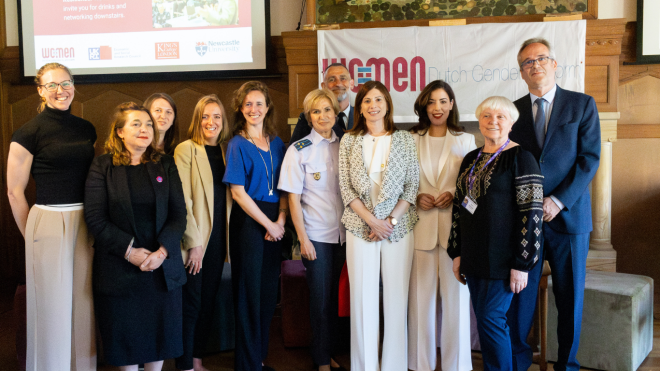30-06-2025
What does real security mean on NATO’s eastern flank today? And what does it look like in today’s world of rising tensions, the militarisation of border regions, and increasingly complex hybrid threats - including disinformation, cyberattacks, and the weaponisation of gender narratives? That question was central to the high-level NATO side-event ‘Reinforcing Resilience: The Role of Women, Peace and Security in NATO’s Eastern Border Security’, held in The Hague.
One answer was clear: true stability, security, and resilience are impossible without gender equality and the full involvement of society. The concept of resilience has never been more important, not only in confronting external threats, but also in addressing the internal challenges that test the very fabric of our Alliance. Today, the security threats the Alliance faces don’t only come from beyond our borders — we also witness democratic backsliding and the erosion of core NATO values, including gender equality, from within the Alliance itself.
Organised by WO=MEN, Newcastle University, and King’s College London - with support from the Economic and Social Research Council - this key event, held alongside the historic NATO summit, explored the strategic importance of Women, Peace and Security (WPS) on NATO’s eastern flank.
WPS as a Core Part of NATO Policy
The panel brought together influential voices from NATO, the Dutch Ministry of Defence, Ukrainian civil society and Bulgarian and Canadian military leaders. They emphasized that WPS should not be treated as symbolic, but as a vital part of security strategy. Irene Fellin (Secretary General’s Special Representative on WPS) explained that the new WPS Action Plan allows for collaboration between governments, the military, academia, and civil society to strengthen resilience through gender perspectives. Koen Davidse (Director General Policy, Dutch Ministry of Defence) stressed that gender equality is not a luxury but a necessity:"Excluding women is not only unjust, it’s strategically unwise.”
Resilience on the Eastern Flank: Gender-Responsive Security
Since Russia’s full-scale invasion of Ukraine in 2022, Europe’s security landscape has changed dramatically. Threats now include not only weapons but also hybrid attacks like disinformation, cyberattacks and anti-gender-based propaganda. These tactics not only destabilize societies but also deepen global polarization. Olena Suslova (Founder of the Women’s Information Consultative Centre (WICC) Ukraine) highlighted that gender equality in her country is not an ideal but a necessity. Women make up a significant part of the armed forces, and their involvement is crucial to national defense. She pointed out that UN Resolution 1325 is the only one that centers women and civil society in peace and security policy.
Colonel Nevena Miteva (Deputy Foreign Minister, Bulgaria/ Gender Advisor, MoD) warned that even 25 years after the adoption of Resolution 1325, WPS is still crucial. Miteva: "Women are not merely participants; they represent change.” Panelists agreed: gender equality must be seen as a strategic advantage, not a side issue. There is now ample evidence and data that gender-responsive leadership leads to better performance, stronger cohesion, and greater credibility. Dany Poitras (Brigadier General, Canada) and Koen Davidse shared how their countries are drivers for WPS through research, veteran networks, and collaboration with civil society. They emphasized that institutions can only change if they also learn to listen.
Strategic communication is the new frontline
Effective communication is essential to make the WPS message resonate. NATO must communicate clearly and proactively about the importance of gender equality and counter disinformation. The message is: this is not an add-on, but a core part of security. NATO’s 2024 WPS Policy is therefore not just timely - it is strategically essential. Integrating gender perspectives into defense and deterrence is not about ideology, but about resilience, readiness, cohesion, and credibility. We must think beyond traditional frameworks and use the full potential of over half the world’s population.
A Call to Action
Fatimazhra Belhirch (Member of the Dutch Senate for D66) concluded the event with a powerful message:"if we are serious about lasting security, we must connect defense, human rights, and diplomacy. Resolution 1325 is not just a date to commemoration; it is a responsibility. We need inclusive systems that prevent conflict and protect peace. This is not just about gender - it’s about resilience and survival. About building a NATO where human security and defense are not separate tracks, but integrated strategies."
This event made clear that we are at a turning point. The stakes could not be higher: this year we are celebrating that 25 years ago UN Security Council recognised the transformative potential of Women, Peace and Security. A vision that centred not only the protection of women, but their participation and leadership, and understanding both as essential to conflict prevention and sustainable peace. The challenges are great, but so are the opportunities for real change.
It means building a NATO where conversations about defence and human security are not separate tracks—but interwoven strategies. Where no one looks away, and everyone steps forward as an agent of change. Because this is a transformative moment in history-not only of struggle, but also of hope. For our security and stability. For our future. And for the generations who deserve to inherit a world where peace is not just promised, but built together.
